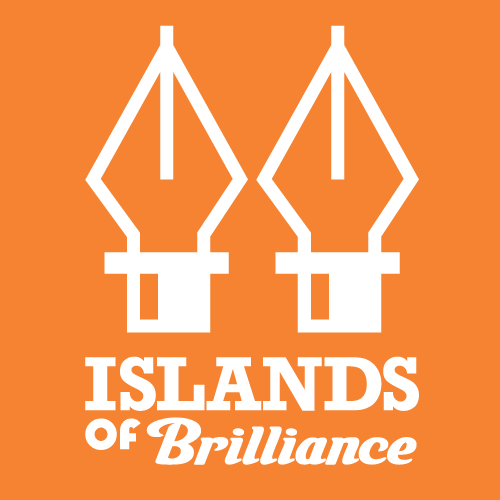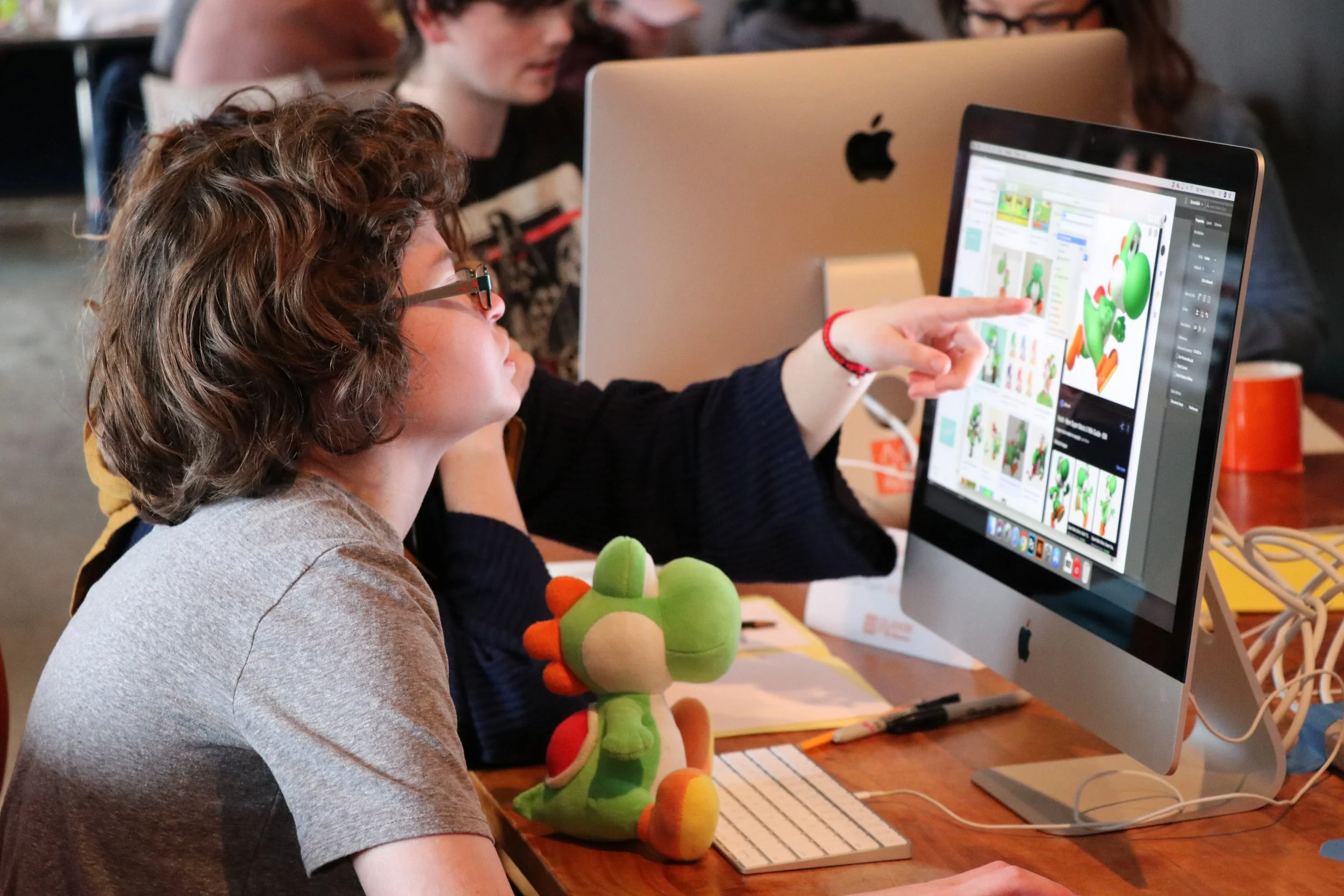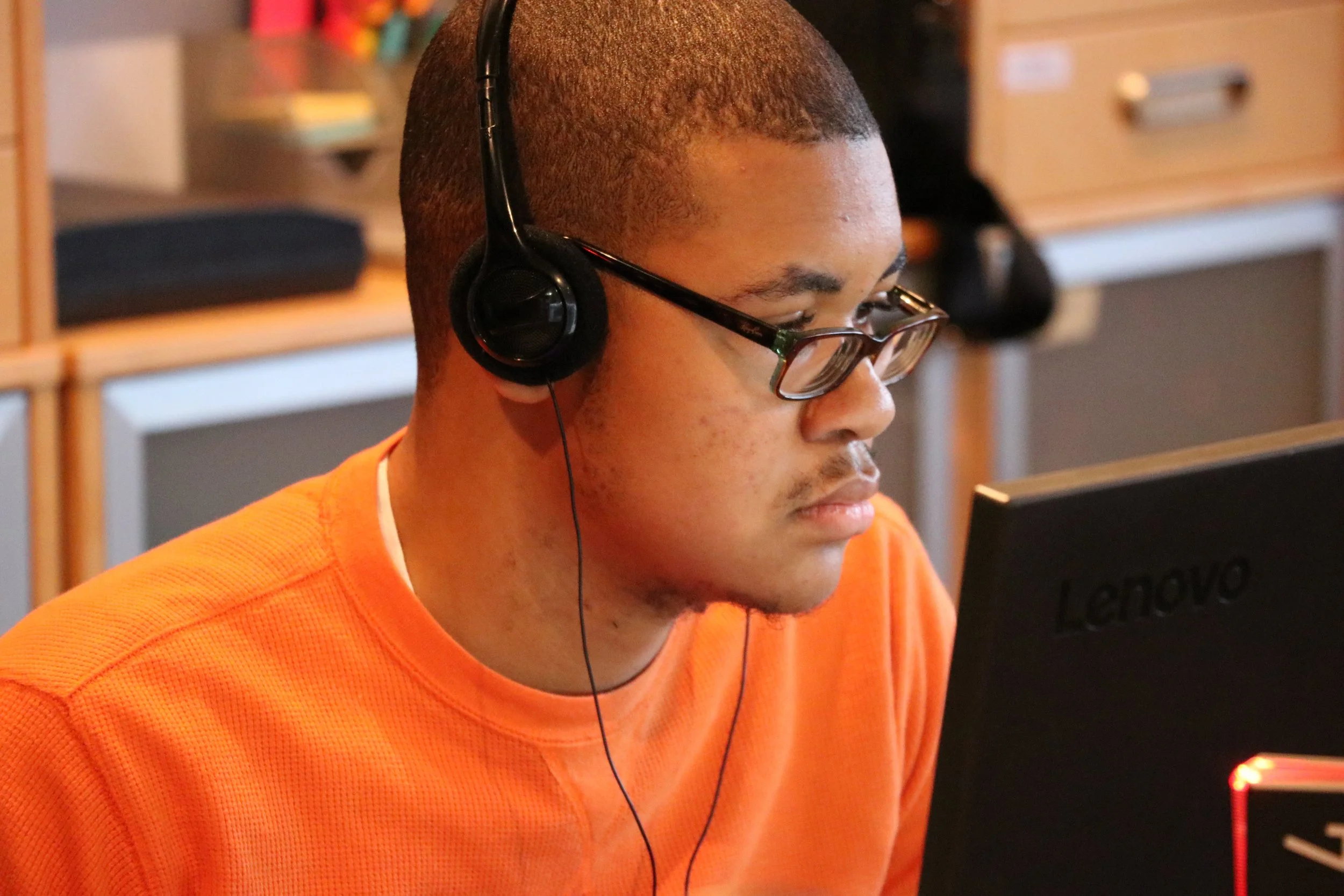Islands of Brilliance finds 'their way into' worlds of students with autism by embracing the things they're passionate about
Written By Amy Schwabe, Milwauke Journal Sentinel
Published 7:00 a.m. CT July 5, 2022
Islands of Brilliance students and staff take part in an “Urban Gnome Project” at the Riverside Park Urban Ecology Center.
In February, a group of students got together with family members and mentors over Zoom.
One at a time, the students shared projects on their screens they had made in programs like Photoshop, Procreate and Illustrator.
There were original drawings of SpongeBob, a Photoshopped image of a roller coaster with a student's family members in each seat, pictures of airplanes, rainbows and the moon, and a many-layered illustration of Star Wars characters.
The group's facilitator asked questions about how each student had worked with their mentor and what new skills and tools they had learned to use, while peers and family members complimented their work in the chat.
At the end of each student's presentation, the facilitator asked, "How would you like to celebrate your hard work?"
Some students asked everybody to do their favorite dance move, others requested thumbs-ups and some just wanted a round of applause.
'To help our kids, we've got to love what they love'
These presentations came at the end of a series of workshops at Islands of Brilliance, a Milwaukee nonprofit that provides learning experiences for children and young adults on the autism spectrum. They live by the words, "Rather than expect students to adapt to the environment, we create the ideal environment."
The slogan represents the epiphany that came to cofounders Mark and Margaret Fairbanks in 2001 when they found out their almost-3-year-old son, Harry, was on the autism spectrum.
"We accepted the diagnosis," Mark Fairbanks said. "But it was the prognosis that really got us."
The neurologist told Mark and Margaret they shouldn't plan on college for Harry; in fact, they shouldn't even plan on him going to first grade.
"We were defiant," said Fairbanks. "We decided we would determine what he was capable of."
They enrolled Harry in early intervention services, where a special education teacher told Margaret how critical it was to figure out how to best communicate with Harry, as many of his behaviors were as a result of his difficulty in expressing his needs.
"Harry's thing was trains, and specifically Thomas the Tank Engine," said Fairbanks. "All day long, that was his world. He was completely on the Island of Sodor."
So one day Margaret decided to "become a train." She picked up one of Harry's trains and talked to it as if she was also a train. "Harry spun around to look at her," said Fairbanks. "He made five seconds of sustained eye contact, the most he had done in 18 months."
At that point, Mark and Margaret decided that trains were "their way in" to Harry's world, that any communication, any education would revolve around Thomas. Trains were how Harry learned math, how he learned to read. He learned how to properly hold a pencil by drawing trains for hours at a time.
"We learned how to leverage his unique subject matter interest to help him. Most kids on the spectrum have something they're into to the exclusion of all else," said Fairbanks. "To help our kids, we've got to love what they love, and go all in on it."
'You be you and we will follow.'
In Islands of Brilliance programs, whether students are matched with one-on-one mentors in Foundations workshops, taking part in group socialization sessions or making art in laidback Doodle Lounge virtual rooms, their activities, conversations and learning start with each student's topic of interest. Staff members and volunteers follow the students' lead.
Before joining Islands of Brilliance as the group's director of special education, Jessica Shafe was a special education teacher in public schools, where she felt limited in what she could provide for students.
"It's like you're trying to fit kids that are square pegs into round holes," said Shafe. "You're forcing students into spaces they don't belong, and that doesn't feel good."
Shafe appreciates the "topics of interest" focus at Islands of Brilliance because she feels children in traditional schools are forced to avoid their interests during the school day, to the detriment of their self-worth as well as their education.
Islands of Brilliance student Abby Mank searches for images of Yoshi during a foundation workshop.
She said everybody — neurodivergent or not — has subjects that interest them more than others, but that neurotypical students are more likely to have social skill sets that allow them to "branch out and talk about subjects that don't interest them."
But she also feels that forcing people on the spectrum to stop talking about the things that are their "whole world" can hurt more than help them to attain educational and social goals.
"At Islands of Brilliance, we tell these students, 'No, you don't have to consistently be changing and adapting to us to make us more comfortable. You be you and we will come to you and talk about what you want to talk about,'" Shafe said. "We see in our programming how good it feels when somebody does talk to them about their interests. It seems to feel so freeing."
Shafe has also seen students naturally improve their ability to talk about different topics and build social skills through their programs. She remembers a student who was talking about his fascination with puppets while another student — who was interested in stop-motion animation — listened. After a while, the students recognized the similarities between their two interests and were able to connect with each other.
Shayne Mack, a 19-year-old Islands of Brilliance student, has been interested in cartoons since he was a child and started imitating the style of his favorite Cartoon Network show, "Ed, Edd 'n Eddy," in his own drawings. He said he loved the style and humor of the cartoon, and also was fascinated by Disney animations like "Beauty and the Beast" and "The Lion King."
He credits his mentors at Islands of Brilliance with giving him encouragement, skills and tools to help take his passion for cartoons to the next level as he has learned to animate his own characters.
"I share the character drawings I've done, and a lot of people at Islands of Brilliance think I usually do a lot of expressive work, like my characters have interesting poses and body movements," said Mack. "That's one of the reasons I want to go into animation as a career, to give me the chance to explore the motion and character expression that I really want to portray."
Shayne Mack collaborates on his illustration project with design mentor Jenny Schroeder during an Islands of Brilliance foundation workshop.
Dan Augustine, the creative director for Epic Creative, employed Mack as an intern at his company last summer. He has also been facilitating workshops for Islands of Brilliance for several years. Augustine called the topics of interest philosophy "foundational" to how volunteers see the students and understand their talents and abilities.
"Rather than forcing them into ways of doing things, we discover things about the students as artists and help them build on their own talents and skills," said Augustine. "And that is helpful to us too. I've learned new ways of looking at things, and I've learned things from the students."
Augustine remembers working with a student several years ago who would draw "beautiful, elaborate" illustrations in her sketchbook and then erase each one. After watching her erase several creations, Augustine asked her why she was doing it.
The student showed Augustine that a very faint drawing remained on her paper. She said she would go home and use the pencil impression as a guide as she added ink and color to her artwork.
"What she was doing was like a lo-fi version of Photoshop. She was creating her own layers on a single set of paper which made a flat 2D illustration more textural," said Augustine. "It was so cool, and I've used her technique in my own art since then."
'Technology was a level setter'
Islands of Brilliance foundational workshops pair students with mentors to help students learn software such as Adobe Photoshop and Illustrator as they create projects based around the students' topics of interest.
One reason Mark and Margaret Fairbanks decided to focus their workshops on technology was based — once again — on their experience with Harry.
When Harry was about 8 years old, he was fascinated with stop-motion LEGO videos, which he watched on YouTube and talked about with fellow viewers in the comments.
"He struggled with communicating with his peers at school, but he was fluent when he was able to use a keyboard," said Fairbanks. "Technology was a level setter for him."
That realization was further reinforced for Fairbanks when he noticed Harry watching him as he worked on Adobe Illustrator. Harry asked his dad if he could try, so Fairbanks gave him a five-minute tutorial, showing him how to draw shapes and change colors.
"A half hour later, he had drawn Percy from Thomas the Tank Engine," said Fairbanks. "It blew me away because he had intuitively figured out how to use the tools I hadn't taught him to make the things he wanted to make."
Autistic students, siblings and parents participate in an Islands of Brilliance Sandbox@ workshop at the Lubar Entrepreneurship Center on the UW-Milwaukee campus.
That experience would inspire the pilot project for Islands of Brilliance — recruiting technology industry volunteers to mentor students with autism — which they tested out in the fall of 2012.
At a computer lab at Discovery World, seven kids were matched up with seven mentors the first week, and Fairbanks said everybody — kids and adults — loved the class as "the mentors and mentees geeked out together on subject matter."
"The following week, five of the seven students had already gotten there 15 minutes ahead of time and found their mentors to start work," said Fairbanks. "We couldn't believe the kids' engagement and focus. It was that combination of subject matter interest, a mentor that shared their interest and the technology. That's when we knew we had something."
'A combination of subject matter interest, a mentor and technology'
Islands of Brilliance opened as a nonprofit in 2015, offering programs for students and their one-on-one mentors.
When a parent calls Islands of Brilliance, staff members talk with them to learn about the student and what their interests are. Then they match them with one of their volunteer mentors.
When the mentor meets with the student for the first time, they'll talk about that interest and brainstorm ways to use technology to create a project. One end result of each project is the poster that students present to their groups at the end of each several-week session.
"If we find out that a student is really into animation, we'll pass that along to the mentor and when the mentor starts working with them, they can right off the bat say, 'Let's talk about animation,'" said Shafe. "They'll talk about the specific parts of animation the student likes and ask if they want to create their own, and then the mentor pulls from that to develop the student's project."
Danielle LaMere concentrates on creating an illustration using Adobe Illustrator during an Islands of Brilliance Digital Academy session.
Mack has been mentored by people with experience in animation, who have encouraged his creativity and talent, as well as taught him how to use the tools.
"Now I'll see an animal and instead of just drawing it, I think, 'maybe I could make a character out of it,'" said Mack. "And I think of how it would look, how it would talk, what its personality would be."
Much of the encouragement for Mack's drawings, animations and character styles has come not just from the more formal one-on-one mentor workshops, but from more laidback virtual social gatherings — an expansion of Islands of Brilliance offerings that was necessary during the pandemic.
'At the end of the day, the goal is community'
By 2019, Islands of Brilliance had grown to 500 enrollments in their technology-based, topics of interest-focused workshops. Then the pandemic happened, and all the sessions had to be canceled.
Islands of Brilliance workshops all start with a question of the day, so the Fairbanks decided to launch a question of the day YouTube series. They asked questions like "Who's your favorite superhero?" and invited their students to send in responses through creative means — a drawing, an animation, a story.
"We filmed all the episodes in our attic and we made 80 episodes," said Fairbanks. "The amount of views and interactions were just amazing. It kept us connected as a community, and our community needed that."
The series also bought them some time to figure out how to pivot their programming during the pandemic. It had to be virtual, and their "Question of the Day" series experience inspired them to make it both casual and social.
In Doodle Lounge, students meet with facilitators in a Zoom room and draw together, share their artwork with each other and just talk. In Natterdays sessions, students and staff work together to collaboratively tell a story — and do a lot of laughing.
"You hear a lot about how virtual doesn't work for students with special needs, and that's true for some people. But for a lot of the kids, they're digital natives, they're comfortable in that environment," said Fairbanks. "Technology allowed students to see each other on a daily basis. Prior to that, their relationships had been more with mentors, but now they had friends who they were sharing memes and art and interests with."
Shayne Mack works in Substance 3D Modeling software during an Islands of Brilliance Digital Academy session.
In a recent Doodle Lounge, Mack shared a drawing he had animated, as students complimented him in the chat and Islands of Brilliance facilitators asked him to zoom in on specific details.
After Mack talked about how he created his animation and where the ideas came from, another student took his turn, sharing a drawing of Thomas the Tank Engine and a Coca Cola can with an angry face. One of the facilitators said they were impressed by the expression in the face and asked to take a screen shot.
Before ending the session, one more student shared a caricature of SpongeBob he had drawn. "Holy moley, that is a perfect SpongeBob," commented facilitator Natalie Derr. "Did you do that from your brain or reference an image?"
"It was from my head," the student answered.
Derr works as a creative technologist at Islands of Brilliance. Much of her day-to-day work is focused around the casual artsy virtual gatherings.
"A lot of students come to us because they're inherently creative, and when they come to Doodle Lounge, they can draw the thing that interests them every time they come if they want," said Derr. "They can bring who they are to Doodle Lounge, and we will make that environment suited to whoever comes. At the end of the day, the goal is community."
She also noted that, although the gatherings have a loose theme, the students don't have to follow it or even focus on art. Derr said some people like to talk about the worlds they're creating in Minecraft or the progress they've made in Beat Saber, and they're welcome to do so.
"Some people come in to talk about movies," she said. "A couple of students are our movie gurus. They go back and forth about what movies are the best, and I've learned a lot of interesting things that way."
Charlie Fairbanks — Mark and Margaret's other son, who started working with Islands of Brilliance near the start of the pandemic — often co-facilitates the sessions with Derr. He said they work to establish a positive and welcoming atmosphere and that students naturally encourage each other and inspire each other's confidence when they see the cool projects their peers are working on.
Mack said he's learned about his classmates' interests through the casual sessions, including many who are interested in cartoons like he is, and that he hangs out on Discord with them outside of Islands of Brilliance, often talking about other topics like 3D art and cars.
"Islands of Brilliance has helped me to be more comfortable talking about my ideas with other people," Mack said. "I used to not work well with people; most of the time, I'd just do my own thing. Now I've learned to become more of a team player."
Contact Amy Schwabe at (262) 875-9488 or amy.schwabe@jrn.com. Follow her on Twitter at @WisFamilyJS, Instagram at @wisfamilyjs or Facebook at WisconsinFamily.








